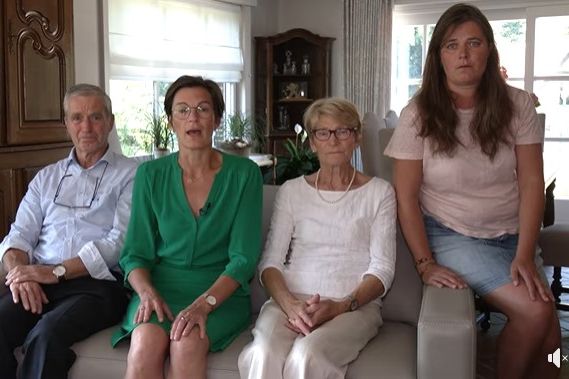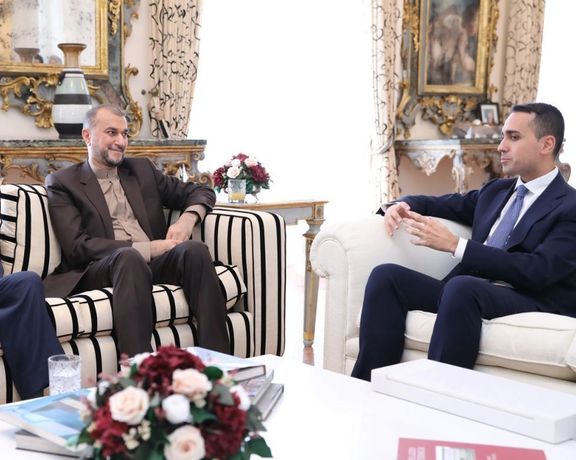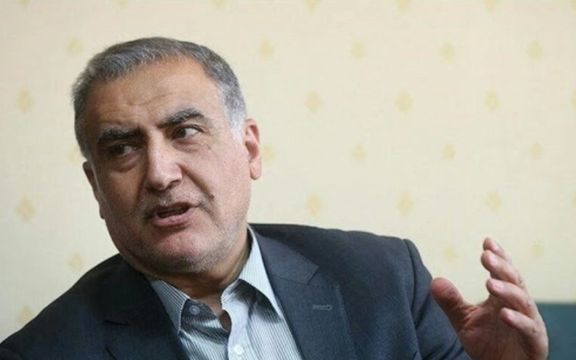Family Of Belgian Aid Worker Held In Iran Asks Help For His Release

The family of the Belgian aid worker being held in Iran has pleaded to their government to do “everything necessary” to secure his release.

The family of the Belgian aid worker being held in Iran has pleaded to their government to do “everything necessary” to secure his release.
“Today Olivier needs your support... It is unthinkable for our family that our democratic Belgium isn’t doing everything necessary to get innocent prisoners out of countries like Iran,” his sister Nathalie said in the video.
She said her brother had received two consular visits that revealed he suffered major weight-loss and a foot infection, adding that “He has spent two months without even a mattress, in a cell lit up around the clock, and being subjected to daily psychological pressure from interrogators.”
Imploring authorities to get Olivier freed, his mother, who barely manages to fight back tears, said, “Since he finished his studies, he has been far from us to help others. Now, help us to get him out of there and bring him home so we can hug him close.”
Numerous people and groups from around the world have been warning about a prisoner exchange treaty between Belgium and Iran that was passed by the Belgian parliament’s foreign relations committee and will go to the full 150-member chamber July 14.
A draft law could lead to the release of Assadollah Assadi, an Iranian diplomat serving a 20-year prison sentence in Belgium for planning a terror attack in Paris four years ago.

The Cannes Film Festival has called for the immediate release of filmmakers Mohammad Rasoulof, Mostafa Alehahmad and Jafar Panahi, detained by Iran in recent days.
In a statement released on Monday, Cannes organizers said, “The Festival de Cannes strongly condemns these arrests as well as the wave of repression obviously in progress in Iran against its artists.”
Panahi, who has won numerous awards, including the Golden Leopard at Locarno Festival, the Golden Lion in Venice, and the Silver Bear at the Berlinale, was arrested Monday as he was protesting the detention of two other award-winning filmmakers Mohammad Rasoulof and Mostafa Alehahmad.
“We are deeply concerned about the arrest of Mohammad Rasoulof and Mostafa Al-Ahmad. It’s shocking that artists are taken into custody because of their peaceful endeavors against violence,” Berlinale organizers said.
Rasoulof – another prominent filmmaker with several international awards such as the Golden Bear – and Alehahmad – who is known in international film galas for his short works -- were arrested July 8 as part of the Iranian crackdown on the signatories of a collective statement titled “Lay down the gun” issued by more than 100 film industry personalities in the end of May.
The statement called on military and security forces who “have become tools for cracking down on the people,” not to suppress protesters during a wave of protests across Iran that were triggered when a 10-story building collapsed in Abadan, leaving at least 40 people dead and dozens missing.

The Iranian foreign minister, who has traveled to Italy, says the Islamic Republic seeks to have its share in the energy market, and reviving the nuclear deal should guarantee it.
Hossein Amir-Abdollahian made the remarks during a meeting with his Italian counterpart Luigi Di Maio in Rome on Monday. “Pursuing political, economic and commercial cooperation is one of the main goals of this trip,” he said upon arrival.
In the meeting, the Iranian diplomat said, “We want the JCPOA to work well. We seriously want a good and lasting agreement and we believe that Iran should be able to take full economic benefit from the JCPOA. The US should understand this fact well regarding guarantees.”
According to Iranian media, Di Mario noted that Italy is ready to play a positive role in the negotiations for the return of all parties to the JCPOA.
The visit comes as the efforts – mainly by the European Union -- to kickstart the stalled Vienna negotiations to restore the 2015 nuclear deal known as the JCPOA keep failing. The latest effort was the proximity talks in Qatari capital Doha on June 28-29, which ended without any progress. The US said that Iran did not show serious intent to move forward in the talks.
Later in the day, Amir-Abdollahian tweeted that “if the window of diplomacy is still open, it’s because of Iran's dynamic initiatives,” noting that the US cannot impose its one-sided views through accusation and sanctions. “Diplomacy is not a one-way street. Reaching the final deal needs the US' acceptance of realities, flexibility and initiatives.”

One day before a planned anti-hijab protest, Iran’s security arrested families of the victims of the 2019 protests accusing them of “trying to instigate riots”.
Security forces raided the home of Rahimeh Yousefzadeh in Tehran on Monday and arrested her and two other mothers whose children were killed by the government during anti-government protests. Yousefzadeh is the mother of Navid Behboudi who was shot dead by security forces in Tehran in November 2019.
Several others, including Nahid Shirpisheh, the mother of Pouya Bakhtiari, and the brother of Vahid Damvar, another victim of government violence, were arrested at their own homes, also on Monday.
The mothers of the victims of government violence have come to be known collectively as ‘Mothers for Justice’. Many among these mothers are usually referred to in reports and on social media by their dead children’s names. In the past few years, they have tried to keep the memory of their loved ones alive while also relentlessly calling for justice for them.
Authorities normally respond to the mothers’ calls for justice with accusations, harassment and even prison.
Quoting an ‘informed source’, the IRGC-linked Fars News agency on Monday confirmed the arrest of an unspecified number of activists by the intelligence ministry during a private meeting. The report dubbed the activists as “insurgents who pretend to seek justice”, a clear reference to Mothers for Justice.
Fars also reported that a foreign national who allegedly gave money to the accused has been arrested in a separate operation.
Fars accused the activists of “establishing contact with a foreign secret service” and receiving money from them to “instigate riot and insecurity in the country under the guise of seeking justice.”
Many believe that the arrests are a preemptive measure against a planned anti-hijab protest on Tuesday.
The ‘Morality Police’ have recently been harshly cracking down on ‘bad-hijab women’ and some officials have ordered extra measures, including to government offices, banks, and public transportation authorities to deny service to ‘bad-hijab’ women.
Authorities have also planned ‘hijab rallies’ at stadiums and other venues on Tuesday (July 12) “to honor, celebrate, and promote” the Islamic notion of the hijab (cover) for women.
Activists, including some of the ‘Mothers for Justice’ have called on women to take action against compulsory hijab on the same day including dropping their headscarves in the streets and other public places. The campaign has been dubbed as the ‘NO2Hijab’.
“They arrested Nahid Shirpisheh because they knew she would come to the street without hijab and many other women would follow her lead,” Mahtab Ghorbani, a France-based poet and activist tweeted. In a video shared on social media last week, Shirpisheh supported the anti-hijab movement and urged everyone to join it.
On Monday a middle-aged woman removed her headscarf in the main square of the city of Tonekabon in the northern province of Mazandaran and protested against compulsory hijab by shouting “freedom” and waving her headscarf over her head. Passers by came to her rescue and freed her when police tried to arrest her and whisk her away.
Crackdown on activists has spiked in the past few days. Security forces on Monday arrested the award-winning film director Jafar Panahi as he was protesting the detention of two dissident filmmakers, Mohammad Rasoulof and Mostafa Al-e Ahmad, at Tehran’s Evin prison.
Rasoulof, Alehahmad and prominent reformist politician Mostafa Tajzadeh who is an outspoken critic of Supreme Leader Ali Khamenei’s policies were also arrested last week.

Croatian football (soccer) manager Dragan Skocic has been dismissed as Iran’s head coach with little more than four months to the World Cup finals in Qatar.
Iran's state news agency IRNA reported on Monday that Iran's football federation had decided to dismiss the 53-year-old, adding that "there are unconfirmed reports that several Iranian candidates have a good chance to replace Skocic."
Skocic, who took over from Marc Wilmots as coach in February 2020, secured the Iranians a spot at the World Cup by topping their qualification group ahead of South Korea. He won 15 of his 18 games in charge but has lost two of his last three matches, including a 2-1 friendly defeat by Algeria in Qatar last month.
Earlier in the day, Iranian media reported that Team Melli’s star striker Ali Daei rejected the post, leaving the fate of the national squad in limbo as there are oppositions to all of the reported candidates for the job. The former Bayern Munich forward was the world's top international goalscorer with 109 goals, until his record was broken by Cristiano Ronaldo in 2021.
Current Oman boss Branko Ivankovic, who led Iran to the World Cup finals in Germany in 2006, and ex-Osasuna midfielder Javad Nekounam, as well as former Iran’s Portuguese coach Carlos Queiroz, who served as the manager of his native Portugal's national team, and many others, are among the other possible names for the job. Queiroz secured Iran’s berth for the FIFA World Cup 2014 and 2018.
Team Melli has been drawn in Group B of Qatar FIFA World Cup along with the United States, England and Wales.

An Iranian lawmaker says the Islamic Republic’s model of governance has created conditions where the people are ignored.
Ahmad Alirezabeighi, the representative of Tabriz in the parliament, said in an interview on Monday that “it is natural that dissatisfaction increases among people because our policies and strategies are carried out by ignoring the people."
Criticizing the government’s decision to scrap the subsidy for essential food and medicines, despite warnings of more inflation and hardship, he said, “Currently, where are our people in the economic equation?” People should be central in the decisions of the country, he noted.
Alirezabeighi, a conservative retired police officer who served as the governor of East Azarbaijan province under former president Mahmoud Ahmadinejad, added that the problem in Iran is not nuclear negotiations adding that past experience shows that “our problem is ignoring people.”
He said that in negotiations if a government does not enjoy the support of its people, it will have to give in to the pressure of foreigners.
“Many think that the solution to our economic problems depends on the [revival of] the Joint Comprehensive Plan of Action (JCPOA). The past eight years of Rouhani's government showed that the JCPOA cannot be effective in this regard,” he added.
Alirezabeighi also said that Iran’s interactions with Russia and China should be based on the country’s interests, referring to criticisms over the Islamic Republic’s a 25-year cooperation agreement with China and a proposed 20-year deal with Russia.